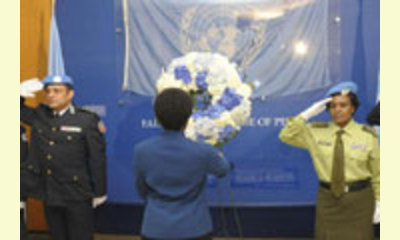|
|
On Peacekeepers’ Day, UN honours those serving and fallen heroes
un article par UN News Centre (abbreviated)
Secretary-General Ban Ki-moon and the United Nations family today (May 27) paid tribute to the more than 120,000 military, police and civilian personnel serving in peacekeeping missions across the world and honoured those who have lost their lives in the cause of peace. “Their deployment is a manifestation of our collective conviction that people who have survived a war should not have to suffer again through a period of insecurity, injustice and fear – and that only by removing these conditions can we engender lasting peace,” Mr. Ban said in his message on the International Day of UN Peacekeepers, observed on 29 May every year.

Deputy Secretary-General Asha-Rose Migiro (centre) lays wreath for fallen peacekeepers
In a separate statement, Mr. Ban condemned the attack that occurred today on a convoy carrying Italian peacekeepers serving with the UN Interim Force in Lebanon (UNIFIL) that resulted in several injuries. The marking of the Day this year was already a particularly sombre occasion. In early April, seven personnel were murdered in an attack on a UN compound in Afghanistan, and a few days later, 32 lives, many of them UN staff, were lost in the crash of a plane serving the UN peacekeeping operation in the Democratic Republic of the Congo.
Those incidents followed others involving fatalities around the world, including last year’s loss of a total of 173 peacekeepers to natural disasters, violence, accidents and disease, including the more than 100 who died in a single catastrophic event – the January 2010 earthquake in Haiti.
“The victims came from all over the United Nations system. They were military, civilian and police – UN volunteers and national staff,” Deputy Secretary-General Asha-Rose Migiro said in her remarks at a wreath-laying ceremony at UN Headquarters for fallen peacekeepers. “They had different responsibilities, nationalities and interests. But they shared an abiding belief in the principles of the United Nations Charter. They put their lives on the line, so that others could have a safer and brighter future.”
In his message, Mr. Ban noted that on the International Day, the world body not only remembers the heavy sacrifices of its staff, but it also hails their accomplishments. “From supporting the Southern Sudan referendum to helping resolve the post-electoral crisis in Côte d’Ivoire, from supporting training, capacity-building and institutional development of police in Timor-Leste to patrolling the hills of southern Lebanon, United Nations blue helmets have represented the Organization at its best – restoring stability; fostering reconciliation; and nurturing hope for a better future,” he said.
Almost 60,000 UN personnel are today actively engaged with national counterparts to help rebuild, renovate and strengthen the foundations on which criminal justice systems are built, according to Dmitry Titov, the Assistant Secretary-General for the Office of Rule of Law and Security Institutions. There are nearly 85,000 military personnel, more than 14,000 police officers, 5,700 international civilian and 13,700 national staff serving in 15 operations on four continents, according to the UN Department of Peacekeeping Operations (DPKO).
|








|
DISCUSSION
Question(s) liée(s) à cet article:
Could Armed Forces personnel be assigned to Culture of Peace projects?,
* * * * *
Commentaire le plus récent:
It makes prefect sense to change military warriors into peace warriors. Peace-keeping can involve protecting civilian populations while reconstruction of nations occurs. It could also involve building schools and water plants and restoring forests. Additionally military skills and equipment are useful during hurricanes and earthquakes and other natural disasters. The dual role of soldiers as protectors and peacemakers makes sense in the transition from a Culture of War to a Culture of Peace.

|
|









